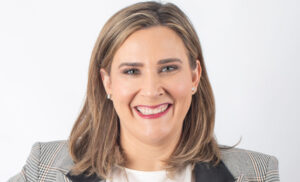6 questions with: Laura Brusca of Forbes
Laura Brusca, senior vice president of corporate communications for Forbes, shares her thoughts on cancel culture and her favorite tool for work.

As Senior Vice President of Corporate Communications at Forbes, Laura Brusca directs strategic corporate communications, thought leadership, issues management, media relations and internal communications. And when she’s not at her day job, the accomplished and award-winning communications executive spends her time serving on boards, including Brass for Africa, Superlost Coffee and of course Ragan’s Communications Week advisory board.
Brusca was also just named President Elect of New York Women in Communications (NYWICI) and will be president in 2024. She’s very passionate about women’s issues and thrilled to be leading this nonprofit in 2024, along with NYWICI’s outstanding board.
We caught up with Brusca to get her to take on the future of comms pros and the evolving communications industry for our new “6 questions with” series — an update of our classic “Day in the Life” profiles.
What book, podcast or other media do you recommend to other comms pros?
Brusca: Axios Communicators newsletter – I like how easily digestible their newsletter is and how they’re highlighting some important trends and conversations for our industry.
[RELATED: Enter our CSR & Diversity Awards by Feb. 17]
What’s your favorite tool you use regularly for work?
Slack – it’s a great way to get in touch with people quickly, especially in our hybrid work environment.
What excites you most about the future of communications?
The future of work, and where communicators play a role. With the major shift to hybrid work, we’re all learning how to communicate in new and different ways – and working to find ways to feel better connected and engaged. I’m excited to see how the communications industry, in partnership with others, will play a key role in shaping the future of work for our employees, companies and industries – from employee engagement, culture comms, brand purpose and beyond.
What communications challenge keeps you up at night?
As a new mom, my toddler is keeping me up more than work these days. But… if I had to choose something, I’d say the constant wave of cancel culture. I think people nowadays are far too quick to cancel companies, brands or individuals. Sometimes this can also bring forward real change and improvement in industries or with companies, but other times they are far too quick to judge without the full picture. With social media, fake news and negativity can spread like wildfire and really cause significant brand damage. As a communicator, it’s important to be aware of those conversations that are happening and try to manage or ensure correct information is being consumed – but not to lose too much sleep over them too.
What’s the biggest challenge you’ve overcome in your career?
Balance. So often our lives as communicators can feel 24/7- especially when you’re early on in your career. I think it’s incredibly important to remember to have some balance between your work and personal life, and to find fulfillment on both ends.
What is the best advice you’ve ever gotten?
“Don’t ask for permission.” I used to have a post-it note with that written on it as a reminder. It’s not about overstepping, but rather being bold and getting things done can lead to more success in your career.
Isis Simpson-Mersha is a conference producer/ reporter for Ragan. Follow her on LinkedIn.








Her final answer is “Don’t ask permission” but if you want to keep your job and your trust at many offices you damn well better.
Can you imagine if a company’s ten top people, or ten top assistants to those people, took actions without permission?
I used to advertise “Editor – Genius Wanted” Or “IT Manager – Genius Wanted.” That approach brought in marvelous candidates and we were a company of the gifted but even superstars needed permission. In every department the boss should have the right to call the shots because otherwise who is steering the ship, getting the results and controlling the costs?
Clients and managements deserve that everyone should obey the rules—certainly including at minimum the rules of law. “Love thy neighbor” is sometimes too strong but it can be best to stay the hell out of thy neighbor’s lane. Admire thy neighbor’s rights–and everyone’s.
“Thou shalt not covet thy neighbor’s ass” may impinge too much on what each of us may have a right to covet but take not without permission what isn’t thine because the ass you save may be your own.
You can give visibility without “asking for permission.”
What I interpreted from Laura’s advice is to own your space. Take ownership and drive it forward. With taxing workloads, multiple priorities and a never-ending stream of information, the most valuable associate is one who takes charge with good judgment.
The associate who takes charge does so in the present but how good the judgment is may not be known until the future. So more valuable than an associate who takes charge may be an associate who does the assigned job well.
What makes Forbes great—and makes the biggest money-earners Forbes lists so successful—may be not associates always having good judgment but good leadership and good discipline.